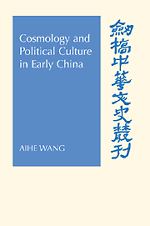Book contents
- Frontmatter
- Contents
- List of Illustrations
- List of Tables
- Acknowledgments
- 1 Introduction
- 2 Sifang and the Center: The Cosmology of the Ruling Clan
- 3 Wuxing: Cosmology in Historical Transition
- 4 Moralizing Cosmology and Transforming Imperial Sovereignty
- 5 Contesting Emperorship: The Center of the Cosmos and Pivot of Power
- Conclusion: Cosmology and Power Reconsidered
- List of Abbreviations
- Works Cited
- Index
5 - Contesting Emperorship: The Center of the Cosmos and Pivot of Power
Published online by Cambridge University Press: 16 September 2009
- Frontmatter
- Contents
- List of Illustrations
- List of Tables
- Acknowledgments
- 1 Introduction
- 2 Sifang and the Center: The Cosmology of the Ruling Clan
- 3 Wuxing: Cosmology in Historical Transition
- 4 Moralizing Cosmology and Transforming Imperial Sovereignty
- 5 Contesting Emperorship: The Center of the Cosmos and Pivot of Power
- Conclusion: Cosmology and Power Reconsidered
- List of Abbreviations
- Works Cited
- Index
Summary
Introduction
The preceding chapter revealed the historical process of moralizing cosmology and transforming imperial sovereignty, as epitomized by the structure of “Wuxing zhi.” This chapter focuses on the content of “Wuxing zhi” – that is, the various interpretations of omens. The discourse of omen interpretation best explains why and how the emperor – his person, body, and behavior – became the center of cosmology and the focus of political contestation.
Within the structure of Earth, Man, and Heaven of “Wuxing zhi,” Ban Gu collected 378 cases of bad omens – catastrophes and abnormal phenomena – along with interpretations by major scholars of the Former Han. Even though the scholars represented in “Wuxing zhi” often contradict one another in their interpretations, there is common ground for all of them; all designate the emperor the center of the cosmos and the agent responsible for the bad omens caused by human disorders. All these interpreters focus their criticism on the emperor – his intentionality, behavior, and most important, his relations with various factions of power. Based on this shared focus on the emperor's person, former scholarship has read omen interpretation as a form of political criticism, checking and restraining the emperor. While this view remains highly illuminating, it carries the implication that the emperor was the possessor of power and that omens were a means of controlling that power.
- Type
- Chapter
- Information
- Cosmology and Political Culture in Early China , pp. 173 - 209Publisher: Cambridge University PressPrint publication year: 2000



